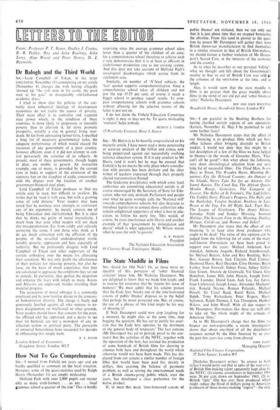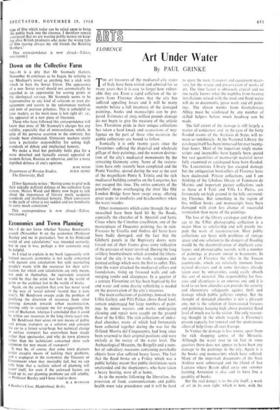Similarly, on number of 'A'-level subjects, the 'fact' quoted supports
comprehensivisation. Since a comprehensive school takes all children and not just the top 15-25 per cent, of course it needs a bigger school to produce 'equal' results. To com- pare comprehensive schools with grammar schools without allowing for the selective nature of the latter is just not on.
I do not claim the Enfield Education Committee is right; it may or may not be. To quote misleading 'statistics' helps nobody.
DUDLEY J. COATES
12 Pembroke Crescent, Hove 3, Sussex
SIR,—Mr Harris is to be heartily congratulated on his masterly article. I have never read a more penetrating or accurate analysis of the follies and crimes now being perpetrated against our successfully evolving national education system. If it is any comfort to Mr Harris (and it won't be) he may be assured that Enfield is by no means the only place where consulta- tion with parents has been derisory and the clear wishes of teachers expressed through their properly elected representatives flouted.
The Gadarene precipitancy with which some local authorities are committing educational suicide is of course encouraged by the Secretary of State for Edu- cation, who not only misleads Parliament and people over what he quite wrongly calls the 'National will' towards comprehensive schools, but also threatens to introduce legislation to compel those authorities who remain enlightened supporters of what is best in edu- cation, to follow his party line. This would, of course, be crass interference with liberty and another example of that 'government by intimidation and decree' which is what apparently Mr Wilson means when he uses the verb `to govern.'
R. R. PEDLEY
President The National Education Association 66 Clarence Road, Teddington, Middx.
The State Muddle in Films
SIR,—Good for Old Nick! Or, as those more re- spectful of this purveyor of 'sober financial criticism' know him, Mr Nicholas Davenport. We are delighted to know that we made him laugh; and to receive his assurance that he 'retains his sense of humour.' We must admit that his solemn protest that the Eady levy 'breaks one of the time-honoured canons of public finance' disposes us to the belief that perhaps he never possessed one. But, of course, the use of a phrase of this kind might be his way of showing it!
If Nick Davenport could now stop laughing for a moment, he might also, at the same time, stop begging the question. He has yet to justify his asser- tion that the Eady levy operates `to the detriment of the general body of taxpayers.' The fact remains (Mr Davenport has yet to provide proof to the con- trary) that the activities of the NFFC, together with the operation of the levy, has assisted the production of some hundreds of British films for showing* in cinemas both here and throughout the world which otherwise would not have been made. This has dis- placed from our screens a similar number of foreign films that would have been paid for, mainly in dollars, thus assisting the balance of payments problem, as well as serving the entertainment needs of a British cinema-going public which, over the years, has developed a clear preference for the native product.
If, to meet this need, 'time-honoured canons of Alas, it would seem that the state muddle in films is no greater than the great muddle about films in the mind of our old pal and 'sober financial critic.' Nicholas Davenport.
ROY AND JOHN BOULTING
Broadwick House, Broadwick Street, London WI SIR,—I am grateful to the Boulting Brothers for having clarified certain aspects of our operations (Letters, November 4). May I be permitted to add some further facts?
Mr Nicholas Davenport states that the effect of our financing is to produce films which are box- office failures often bringing discredit to British studios. I would not deny that this might be a fair description of a few of the films we have helped to finance—in the words of Grouch() Marx, 'They can't all be good!'—but what about the following very short chronological selection from our very long list of successful films: The Third Man, Seven Days to Noon, The Wooden Horse, Morning De- parture, Cry the Beloved Country, An Outcast of the Islands, Never Take No for an Answer, The Sound Barrier, The Cruel Sea, The African Queen, Moulin Rouge, Genevieve, The Conquest of Everest, The Belles of St Trinian's, The Ladykillers, The Colditz Story, Private's Progress, The Baby and the Battleship, Yangtse Incident, Brothers in Law, Room at the Top, I'm All Right, Jack, Tiger Bay, The League of Gentlemen, The Angry Silence. Saturday Night and Sunday Morning, Summer Holiday, The Servant, Four in the Morning, Darling, Morgan, Cul-de-sac and Romeo and Juliet?
Mr Davenport also states that the effect of our financing 'is to keep alive those producers who ought to be dead.' The value of this opinion can be judged from the following list of some of the many well-known film-makers we have been proud to support over the years: Michael Anderson, Ken Annakin, Anthony Asquith, Richard Attenboroueh. Sir Michael Balcon, John and Roy Boulting, Betty Box, George Brown, Jack Clayton, Paul Czinner, Desmond Davis, Basil Dearden, Clive Donner, Bryan Forbes, Ivan Foxwell, Sidney Furie, Sidney Gillet, Guy Green, Anatole de Grunwald, Val Guest, Guy Hamilton, James Hill, John Huston, Joseph Janni, Frank Launder, David Lean, Jack Lee, Jay Lewis, Joan Littlewood, Joseph Losey, Alexander Mackend- rick, Ronald Neame, Roman Polanski, Michael Powell, Sir Carol Reed, Karel Reisz, Michael Reiph, Tony Richardson, Peter Rogers, Harry Saltzman, Ralph Thomas, J. Lee Thompson, Herbert Wilcox, and John Woolf. With all due respect to Mr Davenport, film-makers like these are well able to take on 'the whole might of the armada of American films.'
As to Mr Davenport's charge that the films we finance are non-exportable, a recent investigation shows that about one-third of all the distribution revenues earned by the films financed by us over the past few years has come from abroad. JOHN TERRY Managing Director National Film Finance Corporation,
27 Soho Square, London WI
[Nicholas Davenport writes : 'In answer to both critics I would point out that in spite of the vast arral. of British film-making talent apparently kept alive by the NFFC, (1) cinema attendances in September 1966 were 20 per cent down on September 1965, (2) no British "epic" 'film has ever been produced which might reduce the flood of dollars going to American producers of those money-making "supers"—the only
type of film which today can be relied upon to bring the public back into the cinemas. I therefore remain convinced that we are wasting public money on keep- ing alive British producers who make the wrong type of film (saving always my old friends the Boulting Brothers.'
This correspondence is now el osed.—Ed itor, SPECTATOR.]
Down on the Collective Farm
SIR,—It is a pity that Mr Szamuely (Letters, November 4) continues as he began, by refusing to see Mozhaev's novel as anything but a stick with which to beat the Soviet Union. The appearance of a new Soviet novel should not automatically be regarded as an opportunity for scoring points in the ideological rat-race. Mr Szamuely seems to be hypersensitive to any kind of criticism or even dis- agreement and resorts to the unfortunate methods and tone of partisan polemics. This is unhelpful to your readers, as the main issue is lost sight of: i.e., the appraisal of a new piece of literature.
Those who have followed this correspondence will know that none of Mr Szamuely's charges has any validity, especially that of mistranslation, which, in spite of his perverse assertion to the contrary, has already been eliminated. University teachers surely have a particular responsibility for setting high standards of debate and intellectual honesty.
We make a final but probably futile plea for a more detached and factually correct appraisal of modern fiction, Russian or otherwise, and for a more dignified defence of one's opinions.
ALAN WOOD
Department of Russian Studies, PETER HENRY The University, Hull































 Previous page
Previous page